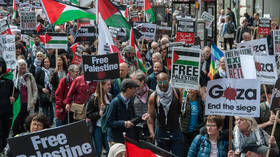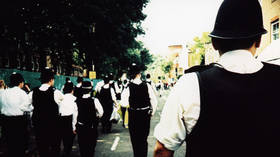How UK undercover cops foiled activist plans to help Palestinians using deceit & abuse...& were there shady deals with Mossad?

Evidence presented to an ongoing inquiry into UK police operations that infiltrated ‘extremist’ activist groups fuels questions over whether the intelligence they garnered was passed on to Israel.
Founded in 2001, the International Solidarity Movement (ISM) is a pro-Palestinian political campaign group, dedicated to the use of nonviolent protest.
ISM has chapters around the world, which regularly train and dispatch volunteers to Palestine, to assist locals with activities such as protests, chaperoning and olive-picking. Despite the movement’s peaceful nature, two volunteers – Rachel Corrie and Tom Hurndall – died after coming into contact with occupation forces, both in 2003. Corrie was crushed by a bulldozer, Hurndall shot in the head by an Israeli military sniper.
In December 2018, the Undercover Policing Inquiry (UCPI), which investigates numerous controversies surrounding the British state’s use of clandestine operatives, revealed ISM’s London branch was infiltrated by Special Branch spy ‘Rob Harrison’ (a pseudonym).
He penetrated the group 2004-2006, and was concurrently involved in a number of left-wing and anarchist movements in the UK capital, his activities even taking him overseas, and resulting in his arrest by uniformed officers under his cover name.
Also on rt.com ‘Disgraceful and illegal’: Israel West Bank destruction blasted by Irish government as EU & UN call for halt to demolitionsThe DJ detective
Harrison’s undercover identity was extensive and colourful, a key strand of his ‘legend’ being his moonlighting as a professional DJ, under the moniker ‘Boogie Knight’. He also posted on the popular left-wing online forum urban75 as ‘Boogie Boy’, typically on the subject of music, but occasionally about politics.
On the forum, he was involved in a regular music sharing scheme whereby members would create CD compilations and send them to other users. Through this scheme he would have learned posters’ identities and addresses.
In any event, as a consequence of this background, he frequently performed DJ sets at ISM London fundraising events, and also parties convened by activists and their friends.
His generally affable, sociable nature, and readiness to buy others drinks down the pub, also meant he was frequently invited into private homes for gatherings and social events large and small. Many were disarmed by his ready admissions of being politically under-educated relative to those around him, and this avowed lack of assurance led them to open up in confidence to Harrison.
Three of the London ISM activists he spied on – Asa Winstanley, Atif Chodhury, and the pseudonymous ‘MCD’ – are all core participants in the ongoing UCPI. Two years after Harrison’s unmasking, Asa still finds the subject difficult to talk about.
“It’s the worst feeling in the world,” he recalls. “A person you trusted, you spent time with, a friend, was actually the complete opposite of everything you thought they were. He joined ISM London before I did and some people now say they were wary of him, but to my mind he was the absolute last guy you’d suspect of being an infiltrator. He was quiet but friendly, helpful and enthusiastic, always willing to go the extra mile.”
Still, despite Asa’s contemporary confidence, reviewing old emails sent by the undercover cop to members of the group, he now sees clearly that Harrison was trying to sabotage the group, subtly stirring up internal trouble. His email address also remained on ISM London’s internal mailing lists until 2013, meaning police could have retained covert access to the group’s private discussions years after his deployment ended.
Asa also says Harrison was largely a silent, passive presence at meetings, although he was highly proactive when it came to mailing the group’s merchandise, offering to drive activists to the airport when they left for Palestine, and other hands-on assistance.
Such activities would have provided him with extensive intelligence on ISM London activists and supporters, their names, addresses and more – information particularly valued by the authorities, as, due to security concerns, ISM members rarely revealed their surnames, or when they were planning to leave.
Passing on secrets to Mossad?
There are indications that the information Harrison collected on ISM may have been passed by British security services to the Israeli government. By 2008, Tel Aviv had managed to obtain such good intelligence on Palestinian solidarity activists that many who attempted to visit Palestine from the UK were quickly deported after arrival or blocked from entering altogether. As ISM London’s primary raison d’etre was to get people into the occupied territories, its value and impact was significantly curtailed.
In 2005, four ISM London activists visited Palestine – one was let in, the others weren’t. Subsequently, the volunteer who gained entry was told by an Israeli human rights lawyer, Gaby Lasky, that the authorities had “international security” records on at least one of the three denied entry.
Whatever the truth of the matter, after the UCPI released Harrison’s cover name, researchers set about tracking down members of the groups he infiltrated. While several echoed Asa’s characterisation, others recalled him behaving in a predatory, creepy manner around female activists, being excessively flirtatious and suggestive to an extent that made them feel extremely uncomfortable.
Such behaviour, which extended to accusations that he groped someone at a party, exacerbated distrust of Harrison in certain circles. Still, the only documented instance of widespread suspicion that he was an undercover officer occurred while he was infiltrating State of Emergency Collective, a direct action group which sought to push anti-war protests beyond mere demonstrations.
Harrison, among other things, helped transport its members to numerous actions by car, including the paint-bombing of election offices. One group scheduled to take part in the attack was eventually unable to attend, and he was said to have gotten very angry at their failure to take part, causing friction between members.
General misgivings about this and other disruptive tendencies on the part of Harrison led to numerous people abandoning the group, and in August 2007, he was asked to leave. Its membership eviscerated, State of Emergency Collective disbanded not long after – it’s an open question whether the movement would have endured were it not for his presence.
Also on rt.com Ongoing legal battle over 2005 UK police killing brings to light covert op to smear victim justice campaignsDeception & abuse
Like many other undercover officers, Harrison deceived a woman into a long-term romantic relationship during his deployment – somewhat uniquely though, she wasn’t an activist.
His courtship with ‘Maya’ (a pseudonym), nonetheless furthered his covert objectives, as she was the friend and neighbour of Atif Chodhury. This gave him legitimate reason to frequently be in the same area as Atif, and to become close friends with him in the process. Atif divulged much intimate personal information to the police spy. It’s the first example to emerge from the UCPI so far of an operative deceiving a non-activist into a relationship in order to surveil a target.
In a statement to the UCPI on November 9, Phillippa Kaufmann QC laid out in shocking detail the exploitation, manipulation and abuse Maya was subjected to by Harrison, not merely over the course of their relationship, but for many years afterwards.
The pair met through the sprawling social scene surrounding ISM London, with Harrison frequently visiting a housing cooperative where she lived with other activists. Their relationship began in May 2006, following an encounter at a fundraising event at which he was DJing.
Maya was initially reluctant for their connection to progress further, but Harrison subjected her to intense pressure, responding angrily to her not wanting to rush into things.
Harrison’s harassment was only just beginning, however. Kaufmann stated that throughout the relationship, he subjected Maya to significant emotional abuse and coercion, engaging in highly controlling behaviour, some of which was clearly calculated to cause Maya to suffer feelings of guilt and low self-esteem.
He regularly accused her of infidelity or promiscuity, bombarding her with texts accusing her of sleeping with other men, and becoming aggressively furious whenever she spent time with other men. Such was Harrison’s bullying, Maya began self-harming, which he was well-aware of, and isolating herself from male friends. Today, she believes his controlling conduct was a means of coercing her into proving her commitment to him.
Harrison would never take her on dates, and rarely see her anywhere other than her flat. Moreover, despite his obsessive, paranoid nature, he would frequently disappear for long periods, not responding to messages or answering his phone, occasionally blocking her number.
Also on rt.com ‘Real world’ wives of UK ‘spycops’ seek justice for lives shattered by the undercover police operationSelf-harm & suicidal thoughts
He ended the relationship abruptly around Easter 2007, claiming his mother was dying of cancer, and disappeared without trace. Devastated by Harrison’s abrupt departure, Kaufmann said Maya began using hard drugs as a way of coping with the loss, and to suppress memories of his abuse. Eventually, she had to travel abroad and stay with family to recover from the shock of the break up, and to kick her drug habit.
Upon returning to the UK, the trauma Harrison inflicted continued to impact her psychologically and emotionally. A Master’s degree that she began in 2006 would take five years to complete – throughout, he continued to intermittently send Maya emails and text messages, and leaving comments on her blog, only ceasing contact in 2011.
Out of the blue, he got in touch with her again in August 2014, asking to meet, which they did. They communicated online regularly thereafter and met several times over the next few months, Harrison frequently speaking about the future, expressing a desire to resume their relationship and one day marry, even discussing what names to give their children.
As a result of his reappearance, Maya broke up with her partner of five years, whom she was living with at the time, and in February 2015, she and Harrison slept together for the first time since their separation almost eight years earlier.
“They had unprotected sex and Maya had to take emergency contraception the following day. The same day Rob disappeared and with the exception of one email he sent to her in 2016, he has never contacted Maya since,” Kaufmann revealed.
Maya learned Harrison was an undercover officer only in March 2019, when a friend informed her. She has struggled to come to terms with how such an important part of her life was based on lies and exploitation, and how such an important person in her life didn’t actually exist. Her mental health deteriorated sharply; she experienced suicidal feelings, and began self-harming again.
In common with all other undercover officers being probed by the UCPI, Harrison initially applied for blanket anonymity, meaning not even his victims could learn his real name. Inquiry chair John Mitting was initially “minded to” accept it, however, upon Maya gaining core participant status in June 2019, the former High Court judge reversed his decision.
Harrison, via his solicitors, acquiesced to her being provided his real name, but only on the understanding that she and her lawyers weren’t permitted to release it publicly. The request was robustly denied, with Mitting stating Maya was “entitled to make such use as she thinks right of personal information which she is entitled to know.”
It was a rare example of the chair appearing to favour the needs of undercover officers’ victims over the officers themselves. Overwhelmingly, real names haven’t been released, despite legitimate and clear grounds for doing so, and in some cases not even cover names have been disclosed.
Think your friends would be interested? Share this story!















